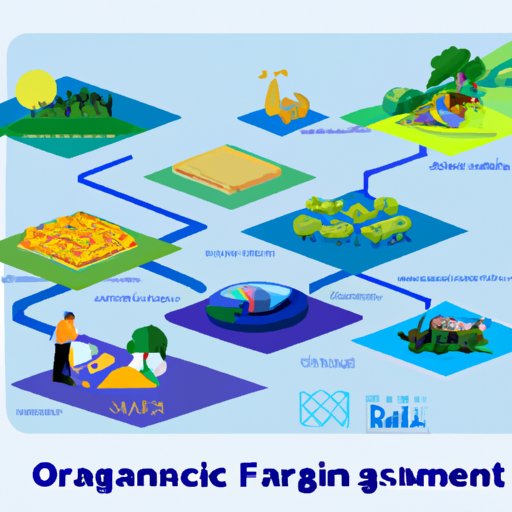Introduction
Organic farming is an increasingly popular form of agriculture that focuses on producing food in an environmentally sustainable way. It involves using natural methods such as crop rotation, composting, and mulching to fertilize the soil and control pests without the use of synthetic chemicals. Organic farming has a number of benefits, including improved soil quality, reduced water usage, and fewer greenhouse gas emissions.
Research the Market
Before starting an organic farming business, it’s important to research the local market and understand the demand for organic produce. Identify potential customers and analyze the competition. Consider what products are already available and how you can differentiate your offerings. You may also want to look into government regulations and incentives related to organic farming.
Develop a Business Plan
Creating a business plan is essential for any new venture. Set goals for your business, establish a pricing structure, and develop a marketing strategy. Identify your target market and create a plan for reaching them. Decide if you’ll be selling directly to customers or through retailers and wholesalers. Make sure to include a budget for startup costs and ongoing expenses.
Acquire Land and Resources
The next step is to secure land and obtain the necessary resources to start your organic farm. You’ll need to purchase or rent land, as well as equipment and supplies such as seeds, fertilizer, tools, and irrigation systems. Consider working with local farmers to share resources and save money. You may also want to look into government grants and loans to help cover the cost of starting your business.
Create an Organic Farming System
Once you’ve acquired the land and resources, you’ll need to create an organic farming system. Maximize the natural resources available to you and minimize your environmental impact. Utilize sustainable practices such as crop rotation, composting, and mulching. Consider growing multiple crops to take advantage of seasonal changes and reduce risk. Also, look into certification programs to ensure your products meet organic standards.
Grow Your Customer Base
Now that you’re ready to start selling, it’s time to grow your customer base. Utilize digital marketing strategies such as social media, email campaigns, and search engine optimization to reach potential customers. Additionally, word-of-mouth advertising is a great way to spread the word about your business. Consider offering discounts or free samples to encourage people to try your products.
Conclusion
Starting an organic farming business is a great way to become self-sufficient and help the environment. The key to success is to do your research, create a business plan, acquire land and resources, and create an organic farming system. Finally, use digital marketing and word-of-mouth advertising to grow your customer base. With the right planning and dedication, you can succeed in the organic farming industry.
(Note: Is this article not meeting your expectations? Do you have knowledge or insights to share? Unlock new opportunities and expand your reach by joining our authors team. Click Registration to join us and share your expertise with our readers.)
